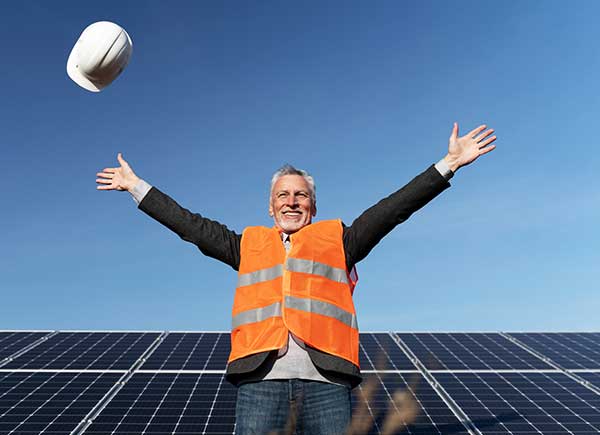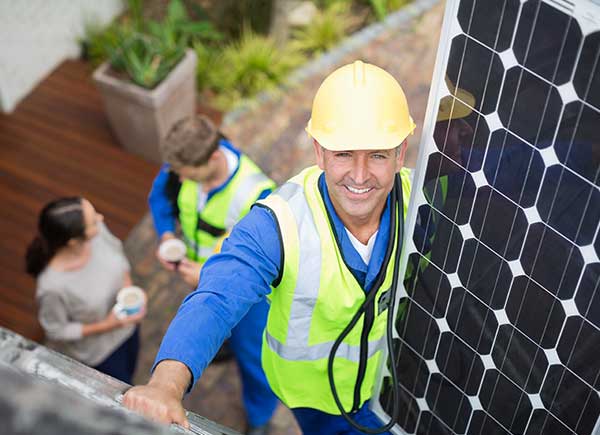Photovoltaic Promotion
 Government subsidies and financing programs for photovoltaic systems are intended to simplify and accelerate the switch to climate-neutral energy. To this end, the German government has taken several measures and passed new laws from which PV system operators based in Germany have been benefiting in particular since January 2023.
Government subsidies and financing programs for photovoltaic systems are intended to simplify and accelerate the switch to climate-neutral energy. To this end, the German government has taken several measures and passed new laws from which PV system operators based in Germany have been benefiting in particular since January 2023.
Photovoltaic systems convert the energy of the sun into usable electricity. In this article, we will inform you about subsidy programs that you may be eligible for. If you are thinking about installing a new solar system on your roof, our experts at WWS Energy Solutions will be happy to provide you with professional PV planning.
Elimination of value added tax
Since 2023, the VAT on photovoltaic systems up to 30kWp and many complementary measures is not applicable. The prerequisite for VAT exemption is that the PV system is commissioned from January 2023. The tax relief also applies retroactively to all revenues from the sale of solar power (up to 30 or 100 kWp) in 2022. The 0 percent tax rate applies to the purchase of a photovoltaic system as well as related components, such as solar modules, solar inverters, (battery) power storage or even the delivery. As a result, there is no longer any difference between net and gross amounts. In the case of PV storage systems, it is possible that subsidies are or were exhausted at the state or municipal level. Attention: Whether a provider passes on the price advantage 1-to-1 or, for example, increases its net prices by 19% is up to each individual. WWS Energy Solutions will always pass on the highest possible price advantage! Other tax points of the new government subsidy are:
- Tax exemption for PV systems in the garden (instead of on the roof)
- Balcony Solar (mini solar systems) are always exempt from VAT
- 0% tax on solar systems with storage
- Zero tax rate for own consumption of solar power from PV systems
- No tax liability for small entrepreneurs (small business regulation)
- PV rental power is tax-exempt if provider is a small business owner
Amended EEG
Die Novellierung des Erneuerbare-Energien-Gesetzes (EEG) trat am 30. Juli 2022 in Kraft, wobei die meisten Neuregelungen seit Januar 2023 gelten. Durch das Gesetz der Bundesregierung für eine lukrativere Einspeisevergütung, soll der Ausbau von erneuerbaren Energien massiv ausgebaut bzw. beschleunigt werden. Eine wichtige Neuerung ist die deutliche Erhöhung der Einspeisevergütung für (gewerbliche) Solaranlagenbetreiber. Des Weiteren darf man ab sofort den gesamten Solarstrom (100%) ins Netz einspeisen (früher 70%). Wer seinen erzeugten Strom komplett ins Netz einspeist (Volleinspeisung), erhält für 2023 eine konstante Vergütung. So erhalten Eigenverbraucher von PV-Komplettanlagen günstig kaufen, 8,2 Cent pro Kilowattstunde und + 10 kWp PV-Anlagen eine Einspeisevergütung von 7,1 Cent pro kWh. Bei einer 15 kWp-Eigenversorgungsanlage erhält man durchschnittlich 7,8 Cent pro kWh (EEG Stand 2023) Bei einer Volleinspeisung erhält man für PV-Anlagen bis 10 kWp 13 Cent pro kWh und ab 10 kWp 10,9 Cent. Die neuen Vergütungen sollen mehr Anreize schaffen, PV-Anlagen auch bei geringem Eigenverbrauch zu errichten. Letztendlich profitiert man aber, aufgrund von Gestehungskosten, am meisten, wenn man den Solarstrom selbst verbraucht und einen Power Storage nutzt.
Promotion through KfW loans
The KfW Bank (Kreditanstalt für Wiederaufbau), financed by state funds, supports the acquisition of photovoltaic systems for private individuals, companies and public institutions. Interesting are the promotional loans 293, 295 and especially the program "Renewable Energies 270". A low-interest loan (from 4.15% effective annual interest rate - as of 2023) to finance a PV system can be applied for:
- Acquisition costs
- Planning, consulting or project engineering
- Installation
Brief summary
 In order to receive the benefit of 0% VAT on PV systems, the following conditions must be met:
In order to receive the benefit of 0% VAT on PV systems, the following conditions must be met:
- The 0% VAT rule has been in effect since January 01, 2023 and retroactively until January 01, 2022 for PV electricity revenues.
- PV system operators must be domiciled in Germany as invoice recipients
- Tax-exempt components must be part of PV systems with a maximum capacity of 30 kWp This includes components such as solar inverters, solar modules, storage and costs for delivery or installation Solar Inverter, Solarmodule, Speicher und Kosten für Lieferung oder Installation
- Solar installations must be located near (private) residences or public or non-profit buildings
Learn more about photovoltaic promotion in the BMF Article. If you would like to start a project with us, our team of experts will be happy to provide you with advice on subsidies, PV planning and installation.
